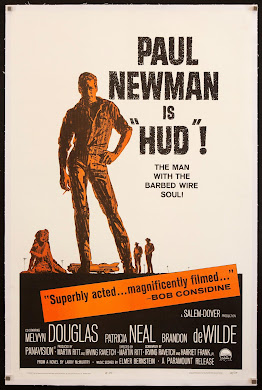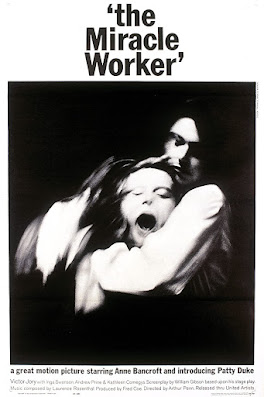Plot Intro
Three male generations of the Bannon family run a cattle ranch in Texas: patriarch Homer Bannon (Melvyn Douglas), his younger son Hud (Paul Newman) and his Grandson (by Homer’s elder, deceased son) Lonnie (Brandon deWilde). Housekeeper Alma (Patricia Neal) helps keep things in order but Homer and Hud are often at odds due to differing values. But the group must pull together when Homer discovers that foot-and-mouth disease might be rife amongst the cattle, which could destroy their livelihood forever…
Hud is many things all at once. It’s a 1960s Western. It’s a cry for freedom from older generations. It’s a story of a fully unlikable anti-hero. But most of all - it’s a mystery. And the mystery is why Patricia Neal won the Academy Award for Best Actress.
I didn’t like this film. Its two hours drags interminably as the macho and twat-in-chief Hud (Paul Newman) wrangles with his decent but old-fashioned dad Homer (Melvyn Douglas - best thing in this dull flick) while his young nephew (Brandon deWilde) decides whether to copy his feckless uncle or his principled grandad. It’s a film about intergenerational masculinity and the natural process of rebelling against your parents’ rules and ways of living.
The main plotline goes around whether the entire herd of cows they own have foot and mouth disease (spoiler: they do). Homer feels they must act responsibly and potentially kill all their animals. Hud thinks they should sell them quickly before they have to test them. There’s also an interesting discussion later about how Hud wants to dig for oil while Homer says they’ll put holes in his land over his dead body. This was good but also came right at the end and was a brief moment. There are flashes of interest here - the scene when Homer stoically kills all his beloved cows is very powerful, and I liked the actual discussions between old and young which boiled down to old American thinking versus the newer capitalist priorities. These discussions however are far and few between.
You might be wondering why I haven’t mentioned Patricia Neal yet. There’s a good reason. She’s on screen for twenty minutes and her character is totally irrelevant to the overarching plot. You could, in a swift rewrite, take her character out and the film wouldn’t change in any way. She does a decent job with a non-role but why she got the big trophy rather than ‘Best Supporting Actress’ is genuinely the most intriguing thing about this film. She just acts a bit flirty and gives an impression of a woman who’s been through the wringer. Not exactly award-worthy.
It’s particularly amusing how Hollywood gave an award to Best Actress to a film entirely about three men. It reminds me of the recent BBC sketch where a casting director gives the lead female role of a new series to Tom Hiddleston. Were there no better films in this year?
Brandon deWilde is another of those Hollywood legends - a highly successful child actor in The Member of the Wedding and more, he then died at 30 in a car crash. He’s 21 here and it’s interesting to see him in what would eventually be a stunted attempt at transitioning to adult films. But really Melvyn Douglas shines in this film (and won Best Supporting Actor) - overtaking Newman who is working hard but failing to make the deeply unlikable Hud a compelling watch.
The scene when Douglas watches as his beloved cows are put down is actually horrible and moving, largely due to his performance.
The machismo that drenches this film is just very dull. The idea that there was a lead female role to win the award is laughable.
Mark
2/10
I disagree a little bit with Doug in that I think Patricia Neal is great in Hud but I do agree that a Best Lead Actress win is completely overselling her role and Best Supporting would have been infinitely more appropriate.
It’s not so much the length of time she has on screen that’s the problem. She has the shortest amount of screentime of all Best Actress winners, with just 21 minutes, and the third lowest percentage of screentime, appearing in a mere 19.5%. But the Academy has often valued quality over quantity when it comes to acting performances. Anthony Hopkins famously only appears in 21% of The Silence of the Lambs and his is a Best Actor-winning performance that has been endlessly quoted, misquoted and parodied. Other shockingly short Oscar-winning performances include Judi Dench’s five mins in Shakespeare in Love, Louise Fletcher’s 22 minutes in One Flew Over the Cuckoo’s Nest, and even Julie Andrews is only in 33% of Mary Poppins. Hermione Baddeley, nominated for Room at the Top, achieved the nomination with just two minutes of screentime.
But in all of these examples, the character, despite their brevity, is of the utmost importance to the film. They either drive it, begin it or conclude it and a rewrite to remove them would provoke many plot alterations. In the case of Neal, she could have quite easily have not been there. Neal does well to depict earthy, hard-nosed life on a ranch, portraying a woman who is dedicated to survival through work and has set aside any personal aspirations she may have. Her most significant scenes such as a conversation with Hud before her departure and an attempted rape scene (spoiler alert AND content warning there, guys) help develop other male characters but don’t give anything to Alma. This is in stark contrast to pretty much all other Best Actress-winning performances who, even if they are not the top billed performer, are nonetheless front and centre of the action and outshining everyone around them.
Also Hud, as a film, is a somewhat dusty and outdated work. If you’re doing a study of '60s counterculture and generational conflict, then it’s a fascinating primary source. We have three generations of men who represent those generations’ interactions at the time of the film’s release. Homer is part of what is colloquially known as The Greatest Generation (born between 1901 and 1927), a generation defined by strict, solid values and traditions thanks to their 19th-century upbringings and being heavily affected by the Great Depression and both World Wars. Hud is of the Silent Generation (1928 to 1945), whose childhood was lost to poverty and warfare, and as a result rebels, either rationally or irrationally, against Homer’s conservative outlook. Finally, Lonnie is the young, idealistic and forward-thinking Baby Boomer (1946 to 1964) who, thanks to post-war improvements in technology and education, has more doors open to him and is still formulating his ambitions in life- should he follow in the traditional footsteps of his grandfather or do what his Uncle Hud probably should have done and leave the Arse End of Nowhere, Texas, for pastures new?
The interaction between the three must have been extremely identifiable to almost all adult audiences in the early '60s. But to our eyes some of the characters’ actions left us a little perturbed. It is never fully explained why Hud is so horrid to his father. He consistently criticises, insults and disobeys Homer and Homer, in the meantime, is calm, kind, stalwart and makes rational decisions (even if he is emotionally suppressed). Indeed, Paul Newman deliberately played Hud as a villain. He’s narcissistic, abusive, an alcoholic, a misogynist, and an attempted rapist. And Newman was surprised when younger audiences ended up idolising him. Posters of Hud would appear on young men’s walls and he became one of many symbols of '60s counterculture rebellion. I can only imagine that, at a time when the young outnumbered the old so significantly post-war, men were attracted to Hud’s physical prowess, impossible good looks and success with women. He’s a male incel’s dream and probably should have been played by an actor who wasn’t hot as hell. The three men certainly symbolise the generational difficulties of the time, but through a modern lens Hud especially is an irrational dickhead, Lonnie needs to get the hell out of the house, and Homer deserves far better, which I don’t think was the initial point of the film.
Having said that, I agree with Doug that the storyline around the cattle catching foot and mouth is well executed. The film does well to emphasise how devastating this is to people whose entire life is solely cattle-rearing and did not have the same technological and scientific prevention measures, plus the financial security, to protect themselves against such a catastrophe. Melvyn Douglas as Homer fully deserved his Best Supporting Actor Oscar as he injects so much power into Homer’s steely yet devastating decision to slaughter the entire herd.
But overall, Hud is, well, a bit of a dud. Its social commentary is a bit lost in the sands of time, there’s not a shred of levity to keep the pace up, and the central character himself was misinterpreted from the day of the film’s release. It made me yearn for our next Best Actress winning performance, a timeless classic that is practically perfect in every way…
The scene in which Homer, Hud and Lonnie have their worst fears confirmed about the cattle is very well shot, with wide angles and the herd wandering and mooing loudly in the distance. While the acting from Melvyn Douglas is outstanding in the foreground, we are reminded that the consequence (and subsequent scene) will mean the total death of every cow in the background.
The attempted rape scene is icky, unnecessary and without any proper consequence. Alma even has the nerve to tell Hud, her would-be rapist, that she may have even let him because he looks hot in a vest (yes, ladies and gentleman, that is in the script). It’s not exactly the lesson in sexual relations that we want to be teaching young people.



